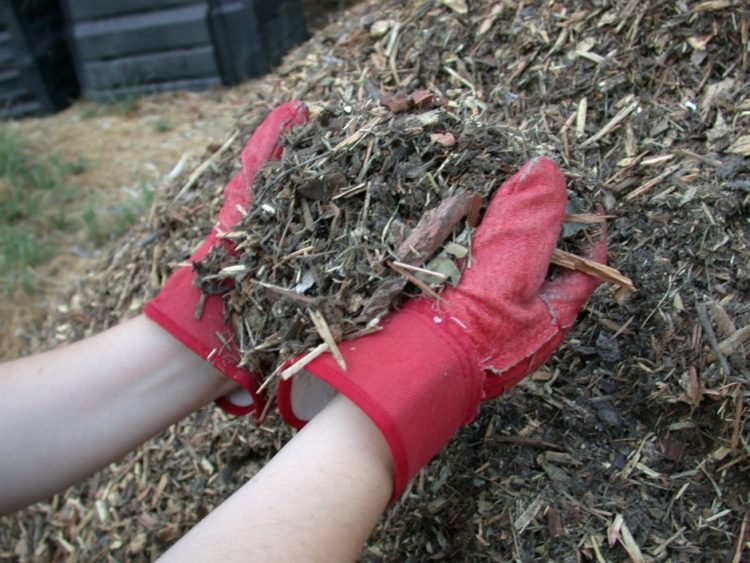Mulch is an effective method of keeping the soil fresh and preventing the growth of unwanted weeds. Some mulches are particularly suitable for a specific type of plant. Let’s see how to achieve the best combinations.
Contents
Bark or pine needles at the foot of acid-loving plants
Some plants need an acidic soil pH to grow well and not suffer from chlorosis. Mulching with pine bark or needles helps maintain a slight acidity in neutral soil. It is particularly suitable for heathers, rhododendrons, camellias, azaleas or magnolias. Pine needles decompose very quickly, adding organic matter to the soil. The large bark sold in bags is much more durable as it takes nearly 10 years to decompose.
Plant residues recycled in flower beds and at the foot of shrubs
If nature’s way of doing things is any indication, shrubs and other plants are often surrounded by twigs, leaves and plant debris that fall at their feet and provide ideal food as they decompose. Take a leaf out of your garden! Use recycled plant residues (dead leaves, shredded branches, straw, grass clippings…) to mulch your flower beds and the base of your shrubs. This mulching will boost the activity of micro-organisms in the soil and provide the nutrients necessary for the growth of your plants.
Biodegradable film for hedges
All gardeners hope to see their hedges grow very quickly to be protected from the wind or the eyes of the neighbors. Good news, mulching will help them! Newly planted shrubs need to establish their roots without competition from weeds. Still too shallow, they have difficulty fighting against weeds, which then take water and nutrients to their detriment. A biodegradable mulch made of coconut, flax or jute fibers, laid directly on the ground will protect your shrubs from this competition. With this method, tests have shown that, with the same amount of watering, the hedge grows twice as fast over a period of 4 years.
Compost for greedy plants and roses
Roses need a lot of nutrients to support their abundant flowering, especially in remontant plants. The same is true for certain flowering plants in our beds (petunias, delphiniums…) or vegetables (tomatoes, melons…). These plants will appreciate a 10 cm mulch of compost at their foot which will allow them to feed themselves in a sustainable way and less violent than with chemical fertilizers.
Mineral mulch for xerophilic plants
Plants adapted to dry or desert environments need well-drained soil and heat for the most part.
Cacti, succulents, gazanias, helichrysum, but also alpine or rock garden plants will do well in a mineral mulch that both drains and restores heat to the plants long after the sun has gone.
Choosing the right mulch for your garden can be tricky. There are several factors to consider when selecting one over another. Some mulches provide instant results, while others take time to produce. Plus, some materials are harmful to your plants, so be sure to choose wisely.
Choosing a mulch for your garden is easy when you understand the benefits and drawbacks of each material. Mulches add a natural look and feel to your garden; they don’t look like they’ve ever been touched. They also help regulate garden temperatures by reducing the heat from the sun’s rays into the soil and preventing excessive moisture from affecting plants’ roots. When choosing a mulch, think about the type of garden you have and what kind of look you want to achieve. For example, leaf mulches look natural but are messy to put down and remove later on. In contrast, bark-based mulches tend to be messier but also last longer since they break down slower than leaf mulches do.
Some types of mulches are toxic or harmful to plants; avoid using these types unless you know what you’re doing. For instance, cigarette butts and shredded paper tend to stain your plants green, while bottle caps can cause foot-and-mouth disease in livestock that eats them. Furthermore, some materials produce unpleasant smells if left in contact with soil for too long— avoid using these types of mulches if this bothers you or your plants tend to become sick from lingering odors. Lastly, remember that some materials need time before they start producing benefits for your garden— so plan accordingly!
Choosing a good mulch is an important part of gardening; it helps mirror nature by reducing excess moisture in addition to providing a natural appearance for your plants. Materials that reduce heat into the soil tend to work best for warm climates; these include straw and hay-based materials which retain heat well during the day but release it during night-time hours when temperatures are lowest.
Cold weather requires different kinds of mulches since their properties need to mimic snow at night— use pine needles or dried needles as these mimic ice at night while retaining warmth during the day. There’s no wrong answer when choosing a suitable material— as long as it works best for your particular needs, it can help make gardening more enjoyable!


